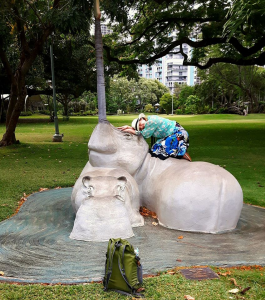Over the years, individuals from institutions and organizations across British Columbia have taken Facilitating Learning Online (FLO) to the next level by participating in the Facilitator Development/Mentorship program and co-facilitating one or more of the FLO courses. If you are thinking about adopting FLO courses at your institution, these are the people who can help!

What got you started on this path to becoming a FLO facilitator and mentor?
The allure of science fiction and robots, a penchant for chat/text communication, and fantasizing about free post-secondary education very likely pushed me in the direction that lead to FLO. Working for Yukon College as an EdTech trainer and experiences in UBC’s Master of Educational Technology (MET) program refined the broad range of interests I now hold in the rapidly evolving social and communicative aspects of technology. I participated in my first FLO course in 2018 alongside a small cohort of colleagues at Yukon College and was impressed with the variety of strategies involved in the cultivation of meaningful online presence, activities, and discussions.
What experience and expertise do you bring to this new support role of helping others to adopt and/or facilitate FLO courses?
When I made a conscious decision to pursue EdTech as a specialization, I thought a big part of it would be enhancing my repertoire of software and hardware skills and classifying technologies by what they do and how they work together. I was surprised to discover that MET courses focused on pedagogy, epistemology, and in some cases, history and psychology. What I have come to believe is that technology, like any tool, is not a “neutral” force; it is made for a specific set of purposes, and sometimes those purposes are clear and helpful for advancing educational goals, and sometimes they are not.
Whenever I’m working in an educational context with technology, my goal is for the tech to fade into the background, and when that happens, you realize that using technology is ultimately about the basics of good teaching and learning: modelling, listening, questioning, giving feedback, creating safe opportunities to practice and share, etc. Translating these activities into online spaces can be a challenge, and the FLO courses offer opportunities to practice.
I have only been working in this field for six years and often feel that I have more questions than answers, but I’m happy to share my experiences and questions with you.
How can people contact you?
Email: sallybourque@gmail.com
